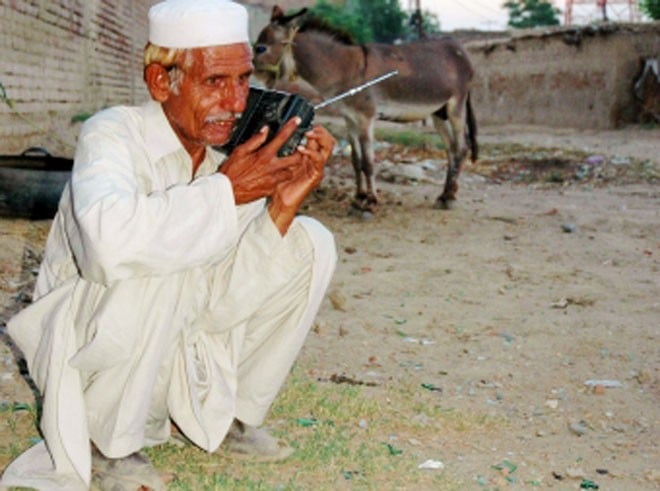
Radio continues to be an integral part of most Pakistanis’ everyday lives

"I grew up in an era when radio was really at its peak. There is so much to remember," says Rukhsana Ahmed, a sixty-year old housewife. "Aapki Farmaish, Talqeen Shah with Ashfaq Ahmed, Subah-e-nau with Neelofar Abbasi; Dildaar Parvez Bhatti and so many other presenters that we would listen to," she reminisces.
"A lot of people in Pakistan’s entertainment industry started their careers with radio. But today’s radio has come to mean an entirely different thing. We used to be very involved in the programmes aired on radio in the past -- in the 60s and the 70s. Today, it is something that plays in the background while you’re driving your car so you can’t pay that much attention," she notes. "Either way, there are a lot of ads that really gets in the way of listening," she adds. She believes that the quality of programmes has gone down and the content really fails to engage the listeners on a deeper level.
Mohammad Ali, a sixty-five year old who used to work as a security guard at a bank, however, disagrees. He says that it is his way of connecting with the past. "Everything changes with time. There are going to be changes in music and the way people talk, their etiquettes and their language," he says, adding, "There are programmes that have old Indian and Pakistani songs. I can listen to these on my mobile."
It seems that no matter where on the spectrum one is, radio is still very much a part of life for Pakistanis. Perhaps, this is due to the fact that commuting distances and times have increased and one inevitably finds one’s self tuning into a radio station to listen to music, the news or even find out about the traffic situation in the city.
The convergence of technology has also made it easier for radio to be accessed from various devices, ranging from conventional radios (not as popular now) to computers and radios.
It has a somewhat ubiquitous presence in Pakistan; even though now it may be accessed via modern gadgets it is still something that the masses and the classes both listen to; from farmers and labourers to white collar professionals, people from all walks of life and belonging to all age-brackets are using the medium for entertainment even today.
Read also: "On radio you do not have to stay visually engaged," says Afzal Saahir
"When I work in the fields, I listen to radio on my mobile phone," says Mohammad Islam, a forty-year old who works at a farm and lives in Bhasin near Lahore. "Though it is an old phone, it is great how I can just plug in earphones and this becomes a radio. I can carry it in my pocket wherever I go. It is a good pastime." He rejoices the fact that he "can listen to a Punjabi radio station in Amritsar while sitting here in Lahore."
That it gets emotional reactions as people talk about what all radio has meant to them bears testimony to the fact that it carries great significance in the history and cultural evolution of the country.
From the independence of the country, the political turbulence that followed soon after, to fighting wars, going through revolutions and coping with censorship, radio has been a vital component of the story of Pakistan.
"I often stream radio online besides listening to it in the car. It’s great that I can access other radio stations - international radio stations as well," says Shirin Naseer, a twenty-three year old undergraduate student. "I like the fact that you don’t have to choose a playlist and that there is unpredictability. I like to listen it in the background when I’m working on a university assignment."
Radio, thus, has become a bridge of sorts between the past and the future. With a great variety of options in terms of stations and programmes, one can easily travel through time. It is a medium that ostensibly has the most diverse audience in terms of psychographic and demographic markers and has still managed to keep them engaged.